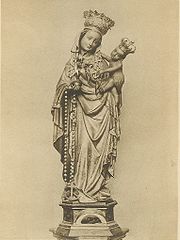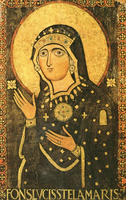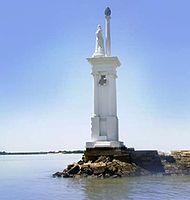
Our Lady, Star of the Sea is an ancient title for Mary, the mother of Jesus. The words Star of the Sea are a translation of the Latin title Stella Maris.
The title has been in use since at least the early medieval period. Purportedly arising from a scribal error in a supposed etymology of the name Mary, it came to be seen as allegorical of Mary's role as "guiding star" on the way to Christ. Under this name, the Virgin Mary is believed to intercede as a guide and protector of seafarers in particular. Many coastal churches are named Stella Maris or Star of the Sea.
Etymology and history
| Part of a series on the |
| Mariology of the Catholic Church |
|---|
 Immaculate Conception by Bartolomé Esteban Murillo (c. 1675) Immaculate Conception by Bartolomé Esteban Murillo (c. 1675) |
| Overview |
| Titles of Mary |
| Prayers and hymns |
| Devotional practices |
Movements and societies
|
| Apparitions |
Key Marian feast days
|
|
|

The name Stella Maris is first applied to the Virgin Mary in the Liber de Nominibus Hebraicis, a translation by Saint Jerome of a work by Philo, but this is apparently a misnomer based on a transcription error. The Hebrew name מרים (originally pronounced "Maryam") was rendered in Greek as Mariam (Μαριάμ). In most manuscripts of Jerome's work, one of the interpretations offered is as "stella maris", star of the sea. But this was probably originally stilla maris, meaning "drop of the sea" (as written in one manuscript), based on מר mar, a rare biblical word for "drop", and ים yam "sea". It seems that at some later stage a copyist transcribed this as stella maris, "star of the sea", and this transcription error became widespread.
Another opinion states that Jerome himself interpreted the name as meaning "star of the sea" or Stella Maris, by relating it to a Hebrew word for star, מאור (ma'or), from the verb אור ('or), to be light or shine.
The etymologization of the name of Mary as "star of the sea" was widespread by the early medieval period. It is referenced in Isidore's Etymologiae (7th century). The plainsong hymn Ave Maris Stella ("Hail, Star of the Sea") dates from about the 8th century. Paschasius Radbertus in the 9th century has an allegorical explanation of the name, writing that Mary is the "Star of the Sea" to be followed on the way to Christ, "lest we capsize amid the storm-tossed waves of the sea."
In the medieval period, stella maris came to be used as a name of Polaris in its role as lodestar (guiding star, north star); it may have been used as such since Late Antiquity, as it is referred to as ἀειφανής "always visible" by Stobaeus in the 5th century, even though it was still some eight degrees removed from the celestial pole at that time.
In the twelfth century, Saint Bernard of Clairvaux wrote: "If the winds of temptation arise; if you are driven upon the rocks of tribulation look to the star, call on Mary. If you are tossed upon the waves of pride, of ambition, of envy, of rivalry, look to the star, call on Mary. Should anger, or avarice, or fleshly desire violently assail the frail vessel of your soul, look at the star, call upon Mary." Pope Pius XII, in his encyclical Doctor Mellifluus, also quoted Bernard of Clairvaux in saying: "Mary… is interpreted to mean 'Star of the Sea'. This admirably befits the Virgin Mother… (for) as the ray does not diminish the brightness of the star, so neither did the Child born of her tarnish the beauty of Mary's virginity."
Anthony of Padua also wrote of Mary as Star of the Sea.
Stella maris was occasionally also used in reference to Christ. Robert Bellarmine (writing c. 1600) deprecated this use of the title, preferring the allegory of Christ as the morning star as the "brightest star of all", classing the less-bright polar star as "paltry" (exigua).
Devotional application
The idea of Mary as a guiding star for seafarers has led to devotion to Our Lady, Star of the Sea in many Catholic coastal and fishing communities. Numerous churches, schools and colleges are dedicated to "Stella Maris, Our Lady Star of the Sea," or "Mary, Star of the Sea."
Stella Maris Monastery, the foundation house of the Carmelite order, was established on Mount Carmel in Haifa in the early thirteenth century. The abbey was destroyed several times, but a refounded Stella Maris monastery is still considered the headquarters of the order.
Devotions to this title of Mary are found in the popular Catholic hymn, Hail Queen of Heaven, the Ocean Star and the ancient prayer Ave Maris Stella. The widely sung "Sicilian Mariners Hymn", O Sanctissima, also reflects this devotion, as do Tamil hymns.
Patronage
Our Lady, Star of the Sea is the patroness of the Netherlands, as well as the American state of Hawaii. The Roman Catholic Church commemorates Our Lady, Star of the Sea on 27 September.
Seafarers
The Apostleship of the Sea (AOS) is often known locally as Stella Maris, whom seafarers recognise for providing pastoral, practical and spiritual support via their port chaplains and ship visitors in ports around the world. Our Lady Star of the Sea is the patron of the AOS.
The Apostleship of the Sea has for many years now, been commemorating the Feast of Stella Maris, Our Lady, Star of the Sea, with Mass each year in September for seafarers. It is a day to pray for all seafarers and give thanks for their contribution to global trade. At a gathering during the Stella Maris Mass in Westminster Cathedral in 2016, Archbishop of Westminster Cardinal Vincent Nichols said, "Caring for seafarers is a profoundly Christian thing to do."
In the Philippines' historic Battles of La Naval de Manila, many believed that Mary's intercession caused the victory.
Gallery
-
 The star on Mary's robe alludes to her epithet of Stella Maris
The star on Mary's robe alludes to her epithet of Stella Maris
-
 Our Lady, Star of the Sea, Goleen Church of Our Lady, Ireland.
Our Lady, Star of the Sea, Goleen Church of Our Lady, Ireland.
-
 Early Medieval Stella Maris icon at the Santa Maria in Via Lata basilica, Rome.
Early Medieval Stella Maris icon at the Santa Maria in Via Lata basilica, Rome.
-
 Stella Maris Lighthouse on the Uruguay River near the town of Concepción del Uruguay in Argentina.
Stella Maris Lighthouse on the Uruguay River near the town of Concepción del Uruguay in Argentina.
See also
Notes
- Isaiah 40:15 is the only instance in the Hebrew Bible where it takes this meaning; Strong's Concordance H4752, from the root מרר "trickle" (H4843).
References
- S. Eusebius Hieronymus. Liber de Nominibus Hebraicis (PDF). pp. 10, 32. Archived from the original (PDF) on 2023-01-31.
- Allen, Richard Hinckley (1899). Star-Names and Their Meanings, page 454. LCCN 99004138. OL 529444M – via Internet Archive.
-
 Herbermann, Charles, ed. (1913). "The Name of Mary". Catholic Encyclopedia. New York: Robert Appleton Company.
Herbermann, Charles, ed. (1913). "The Name of Mary". Catholic Encyclopedia. New York: Robert Appleton Company.
- ^ Arie Uittenbogaard. "Etymology and meaning of the name Miriam". Abarim Publications (in English and Hebrew). Archived from the original on 2022-04-08. Retrieved 2015-10-20.
- Hom. II super "Missus est," 17; Migne, P. L., CLXXXIII, 70-b, c, d, 71-a. Quoted in Doctor Mellifluus 31
- Bernard of Clairvaux quoted in Doctor Mellifluus 31
- Huber, Raphael M. (Raphael Mary) (1948). St. Anthony of Padua: Doctor of the Church Universal; a critical study of the historical sources of the life, sanctity, learning, and miracles of the Saint of Padua and Lisbon. Milwaukee: Bruce Pub. Co. OCLC 609122069. OL 25898032M – via Internet Archive.
- Godman, Peter (2000). The saint as censor: Robert Bellarmine between inquisition and index (in English and Latin). Brill. p. 309. ISBN 978-90-04-11570-5. LCCN 00039825. OL 9084050M.
Hæc appellatio stelle maris tribui solet Beate Virgini. Fortasse melius de Christo diceretur 'stella splendida et matutina'… am stella maris est stella polaris, quae exigua est. Stella splendida et matutina est stella omnium fulgentissima, quae ab astrologis dicitur stella Veneris
- "Stella Maris Church – Carmel Holy Land".
- Budwey, Stephanie. Sing of Mary: Giving Voice to Marian Theology and Devotion, Liturgical Press, 2014 ISBN 9780814682937
- Reed, Isaac, ed. (November 1792). "The Sicilian Mariner's Hymn to the Virgin". European Magazine and London Review. 22 (5): 385–386. Retrieved 2016-10-18.
- Herder, Johann Gottfried (1807). "An die Jungfrau Maria: Ein sizilianisches Schifferlied". Stimmen der Völker in Liedern (in German and Latin). pp. 175–176. Retrieved 2016-10-18.
- Savariappan, Arockiam (2023). "The Blessed Virgin Mary in contemporary liturgical and paraliturgical Tamil hymns". Marianum. 85: 135.
- "Patronage of Nations : University of Dayton, Ohio". University of Dayton. Archived from the original on 2021-10-19. Retrieved 2020-05-13.
- Ryan, George (2019-06-12). "Did You Know? The Patron Saints for All 50 States". uCatholic. Retrieved 2023-02-03.
- "Stella Maris Feast Day Celebration Masses | AoS". Stella Maris. Archived from the original on 2020-06-10. Retrieved 2020-05-13.
- "Stella Maris : University of Dayton, Ohio". University of Dayton. Archived from the original on 2021-10-19. Retrieved 2020-05-13.
- "Cardinal Nichols: Caring for seafarers 'profoundly Christian'". Caritas Social Action Network. 2016-10-11. Archived from the original on 2021-03-04. Retrieved 2022-04-08.
| Mary, mother of Jesus | |||||||||||||||
|---|---|---|---|---|---|---|---|---|---|---|---|---|---|---|---|
| Family |  | ||||||||||||||
| Life |
| ||||||||||||||
| Mariology |
| ||||||||||||||
| Veneration |
| ||||||||||||||